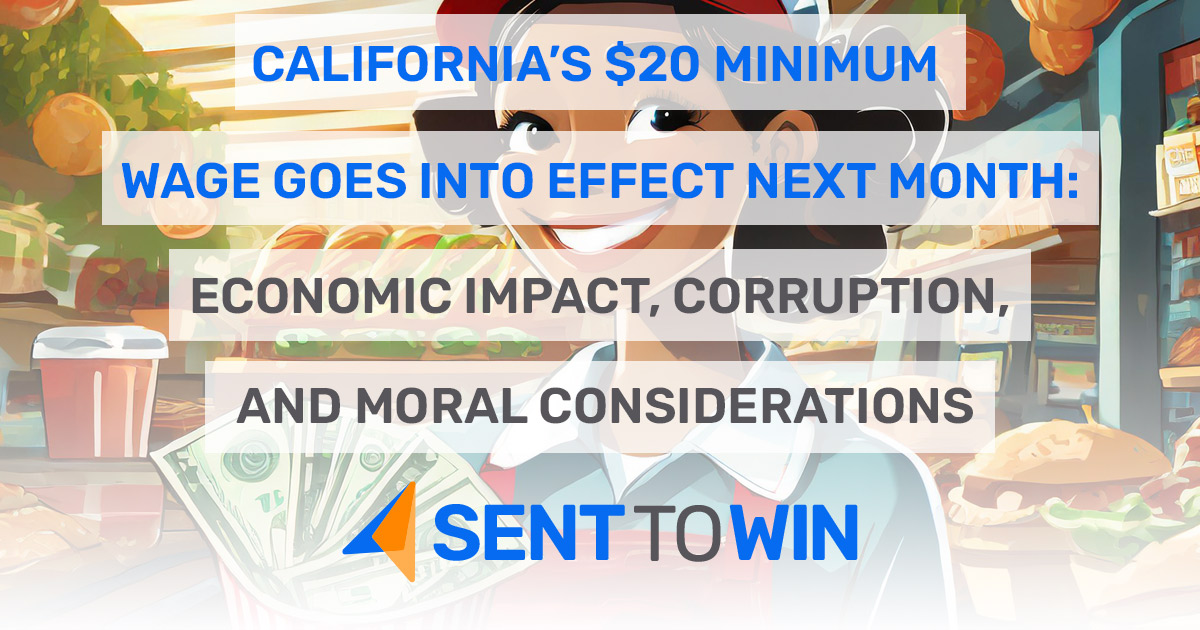California’s $20 Minimum Wage Goes into Effect Next Month: Economic Impact, Corruption, and Moral Considerations
In today’s newsletter:
- California’s $20 Minimum Wage Goes into Effect Next Month: Economic Impact, Corruption, and Moral Considerations
- Flying Cars, Market Watch, and Robbing God
- Justice Wears Suspenders: YouTuber Coffeezilla Exposes Financial Fraud, Crypto Schemes
California Governor Gavin Newsom signed two controversial bills last year, which raise the minimum wage for fast food workers to $20 per hour, effective April of this year (up from $16 currently), and which raise the minimum wage for workers in the healthcare industry to $18, $21, or $23 per hour in June (this includes support staff, such as maintenance workers, hospital gift shop employees, etc.).
While these new developments naturally affect Californians first and foremost, there are implications for the rest of the country as well. California is politically and economically influential, and often, the laws that pass in CA are not far behind in other states. Beyond this, California supplies an impressive amount of the food, entertainment, and services of the country at large, and disruptions in the California economy can have larger implications.
Advocates of these bills stress compassion for the common worker, the difficulty of making a living on the current minimum wage considering the high prices in the state, and the profits of major companies employing workers at minimum wage. Opponents of these bills stress that they aim to defy reality – which never ends well – resulting in a loss of jobs and wages for the most vulnerable in society.
The economic impact is likely to be rather devastating.
The situation highlights a common tension Christians in business experience – a balance between interests of compassion and prudent stewardship. To that end, we are going to do a quick dive into the costs of these bills, the reality they brush up against, and the corruption that has members of both parties fuming. Compassion does not have to be at odds with prudence, and even if compassion is indeed the higher good – fantasy is not a virtue. Denying reality always hurts people in both the long and short run.
The Costs of Minimum Wage
At first blush, minimum wage laws seem like a no-brainer to the Christian leader. The Epistle of James is full of condemnations for the wealthy who oppress their workers and hold back payment. The Old Testament has plenty to say about oppressing laborers who are worthy of their wages. Christians throughout history have fought for the dignity and good of the poor and downtrodden. Worker exploitation laws, in general, are, therefore, a worthy cause, and we can get behind the core idea here.
The problem is that the law of unintended consequences rears its ugly head when we act rashly.
Thomas Sowell, the brilliant economist, has this to say about minimum wage laws in his seminal work Basic Economics:
“Making it illegal to pay less than a given amount does not make a worker’s productivity worth that amount – and, if it is not, that worker is unlikely to be employed. Yet minimum wage laws are almost always discussed politically in terms of the benefits they confer on workers receiving those wages. Unfortunately, the real minimum wage is always zero, regardless of the laws, and that is the wage that many workers receive in the wake of the creation or escalation of a government-mandated minimum wage because they either lose their jobs or fail to find jobs when they enter the labor force.”
It is not surprising, then, that California already has an unemployment rate that is nearly 30% greater than the federal unemployment rate, and according to all reasonable economic analysis, this will only make matters worse in the state. According to CalMatters:
“[These laws] are going into effect in a competitive labor market that has seen employers, especially small businesses, struggling to hire and retain workers… The new fast-food minimum wage laws could push up pay for other restaurant and food workers, experts say.”
We spoke to Emilee D., a wife and mother of two living in San Diego, California, about the rising price of food service. “We don’t really eat out,” she said. “Not often. You can’t here.”
Greatly increasing the costs of doing business increases the cost to consumers (McDonalds, Chipotle, and Jack in the Box have already announced their plans for raising prices at their California locations), which leads to shrinking demand, which leads to less need for workers, and fewer services offered. It’s a vicious cycle.
In a piercing critique at The Hill titled “California’s Minimum Wage Woes Are a Cautionary Tale for the Nation,” Independent Institute research fellow Adam Summers writes, “Some workers will benefit, but many others will see their hours cut and benefits slashed or end up losing their jobs to compensate for the higher costs. Pizza Hut restaurants across the state are already planning on eliminating more than 1,200 delivery driver positions (a number that is likely to grow). In response, automated elements, such as ordering kiosks, will increase, and human-provided services will decrease. Less money will be left over for other innovations or investments in the business. Businesses that are already struggling to get by will close, leading to even more job losses.”.
Lessons for Christian Leaders
Wanting to see fast-food workers and people in the healthcare industry thrive is a good and praiseworthy impulse, but embarking on a path that will, in fact, impoverish the very people we claim to be helping is not virtuous.
Thomas Aquinas, the great theologian, once wrote, “Virtue is that which makes its possessor good, and his work good likewise.” In other words, even though Christians are not absolute utilitarians (the ends do not justify the means), the ends must have their due considerations, and reality gets a say in the matter. Impotence is not virtuous, nor is promising delusions to the needy while failing to meet their actual needs.
“If a brother or sister is naked and destitute of daily food, and one of you says to them, ‘Depart in peace, be warmed and filled,’ but you do not give them the things which are needed for the body, what does it profit?” – James 2:15-16
INDUSTRY INSIGHTS
Flying Cars, Market Watch, and Robbing God
Flying Cars
Alef Aeronautics, a “flying car firm,” has taken nearly 3,000 preorders for its 8-rotor Model A, a $300,000 vehicle of the future, targeted for a 2025 release. The Model A, which looks and drives like a regular car, is, in fact, capable of vertical takeoff and flight and seats two people. A 4-seat version (Model Z) is also in the works. Alef is backed by SpaceX and is not, as of yet, publicly traded. A number of other startups are also working on legal, commercially available flying cars for consumers, but many of these do not look like cars, have jet-like wings, or resemble more of a helicopter. There are, naturally, infrastructure and safety concerns, but these will be handled on a country-by-country basis and will no doubt develop as the technology rolls out. Many are excited about this new leap in personal mobility, but others, such as the Center for American Progress, argue that flying cars will “undermine democracy” by further lessening geographical proximity between citizens and social cohesion. A more common take is that flying cars will lessen traffic congestion and actually increase the connection between urban and rural environments by making transportation easier and more efficient.
Market Watch
The Dow Jones continues to hover around 39,000, while the S&P 500 and Nasdaq both saw gains this week. AI continues to drive investment, as evidenced by Nvidia’s impressive rally. The chip maker now commands a $2 trillion market cap and a stock price that has more than tripled since last year, though some fear over-speculation. Bitcoin has risen sharply in the last month, setting a new record valuation at north of $65k each. Ethereum, likewise, is up about 50% since last month. Oil is up slightly over recent prices, at about $78/barrel (as of Tuesday), and gold is rising, hitting an all-time high Tuesday (before adjusting for inflation). 30-year fixed mortgage rates remain elevated, at just over 7.5% as of Monday, according to Curinos. Warren Buffett recently released Berkshire Hathaway’s first shareholder letter since Charlie Munger’s passing, wherein Buffett encourages investors to focus on fundamentals and long-term value, not temporary market movements.
Robbing God
Calls for accountability and transparent financial reporting are mounting, as key statistics are being highlighted online by accounts such as “religionbusiness.” According to the Association of Certified Fraud Examiners, non-profits (including churches) lose between 5-7% of donations each year to fraud and theft – more than is spent on global missions, and a survey by Lifeway Research suggests that at least 1 in 10 churches experience some sort of embezzlement. To help organizations combat this, Princeton Theological Seminary’s Overseas Ministries Study Center lists some foundational principles for handling money, and LMBC has released basic guidelines for churches and parachurch organizations to protect against ecclesiastical crime.
Sunday School
Q. What was Noah’s ark made out of?
A. Gopher wood.

“Pyramid scheme?! Jack, don’t be ridiculous. I don’t like the word ‘scheme,’ and anyway it’s more like a triangle.”
TIPS & TRICKS
Justice Wears Suspenders: YouTuber Coffeezilla Exposes Financial Fraud, Crypto Schemes
Investing is hard, particularly for those who are newcomers to the world of ROI, P/E, capital gains, blockchain technology, yield vs. face value, etc. It can be difficult to know if you’re getting into something promising and legitimate or being hoodwinked by a flashy scam.
Enter Stephen Findeisen, AKA Coffeezilla, an independent investigative journalist uncovering the truth behind popular grifts, advocating for restitution to victims, and occasionally even getting a bad guy arrested. According to the bio on Findeisen’s YouTube page, which boasts nearly 3.5 million subscribers, “I uncover scams, fraudsters, and fake gurus that are preying on desperate people with deceptive advertising. If you have to ask… it’s probably too good to be true.” From his “ten million dollar studio” (a tongue-in-cheek appellation for what is obviously a green-screen location, boasting a Blade Runner aesthetic and a hovering Lamborghini),
Coffeezilla meticulously investigates the claims, financial records, and results of scammers big and small for the purpose of saving people from losing their hard-earned cash.
Best of all, it’s pretty entertaining.
Stephen styles himself “the internet detective,” and he dresses the part, wearing suspenders and adopting the persona of an old-time private investigator in a film noir. An excellent storyteller, he is able to hold the attention of the average viewer even while documenting complicated financial data. The result? He’s been threatened with lawsuits and death threats and has received plenty of slander/libel online. But he is undeterred. Scammers beware – Coffeezilla is out there.
What makes all of the theatrics, coupled with responsible journalistic practices, all the more wonderful is Stephen’s simple, revealing, unassuming bio on X:
“Internet Detective Exposing Scams. Follower of Jesus.”
That’s it.
Having watched quite a bit of Coffeezilla’s videos, I have never seen him sermonize. He tells his audience, “Don’t trust what some guy on the internet says, guys. Not even me.” Though he is sometimes attacked as being holier-than-thou or self-righteous – those accusations (that seem to mostly come from the people whose schemes he is exposing) fall flat. What we seem to have is a simple believer with a passion for truth and justice, serving the world for the sake of his God, but he mostly keeps his motivations to himself. His heart is for the victims, he does good work, and maybe, just maybe, the world is a tiny bit more honest and fair because of Stephen Findeisen.
There’s something inspiring about that.
You can check out the Coffeezilla YouTube channel here.
Quick Hits
- Walgreens and CVS to begin selling abortion pills, in a move that has drawn sharp criticism and outrage from Christian and conservative voices.
- The Wall Street Journal offers expert tips on how to invest in a bull market.
- The merger between Spirit Airlines and JetBlue is officially off.
- A federal judge has ruled that Christian companies do not have to pay for transgender surgeries.
- Google co-founder admits that the company “messed up” with its rollout of AI product Gemini.
- For the first time since 2016, Target’s sales declined.
Guess the Prompt
Our “California’s Minimum Wage” graphic was generated using AI prompts. Guess the prompt for your chance to win Sent To Win gear. Just reply to this email with your best guess.
For Kingdom Leaders, By Kingdom Leaders
Bringing Kingdom-minded leaders like you fresh perspectives and insights on business, finance, and leadership trends.








